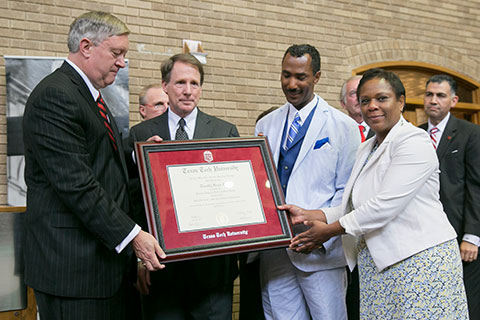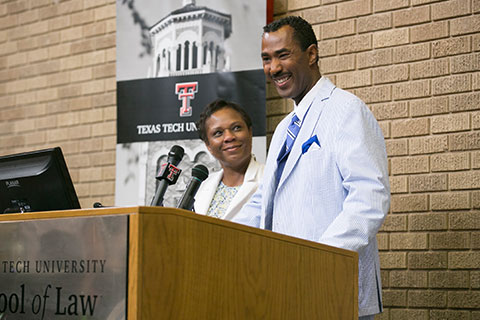Honorary Degree Presented to Timothy Cole Family
Ceremony was held to honor Timothy Cole and present his family with an honorary degree.
May 18, 2015 | Written by Doug Hensley
 Chancellor Robert L. Duncan, center, presents an honorary degree for Timothy Cole
with President M. Duane Nellis, from left, to Cory Session and Karen Kennard, Tim's
brother and sister.
Chancellor Robert L. Duncan, center, presents an honorary degree for Timothy Cole
with President M. Duane Nellis, from left, to Cory Session and Karen Kennard, Tim's
brother and sister.Members of the Timothy Cole family were presented with an honorary degree from Texas Tech University Friday (May 15), recognizing Cole’s sacrifice, legacy and contributions to reforms in the state’s criminal justice system.
The degree in law and social justice was approved at the March meeting of the Texas Tech University System Board of Regents, many of whom were in attendance at the ceremony. Presenting the degree on behalf of Texas Tech University was Chancellor Robert L. Duncan and President M. Duane Nellis.
“It is a special moment for the Texas Tech University System,” Duncan said. “Today we remember the courage of Tim Cole, and we are inspired by him. As I have said before, honorary degrees come from the heart of the university, and while I am always proud of Texas Tech, I am a little bit prouder today.”
The ceremony was held at the Texas Tech University School of Law. The degree was presented to Cory Session, Tim’s brother, and Karen Kennard, his sister.
Some 30 years ago, Cole was expelled from Texas Tech University after being accused of rape by another student. He was convicted the next year and died in prison in 1999. A decade later, DNA evidence showed he was not the rapist. Cole was posthumously pardoned by Gov. Rick Perry in 2010.
|
Cole was exonerated after another man, Jerry Wayne Johnson, confessed to the rape while serving life in prison for another crime. In 2009, the Texas Legislature passed the Tim Cole Act, which increased the compensation people who have been wrongly imprisoned can get from the state. According to the state comptroller’s office, in the years since the legislation was passed, almost 50 people who have been exonerated have received more than $57 million. “This is a bittersweet moment,” Nellis said, “but we are proud to posthumously bestow this much-deserved honorary degree on Timothy and hope it lends to the long and difficult healing process the Cole family has endured.” |
 From left, Timothy Cole's sister, Karen Kennard, and brother, Cory Session, make remarks
at the event.
From left, Timothy Cole's sister, Karen Kennard, and brother, Cory Session, make remarks
at the event.Duncan praised Texas Tech University faculty for their vision in approving the honorary degree. Likewise, he thanked Nellis for his leadership. For an honorary degree to be conferred, university rules require a faculty member must nominate the potential recipient. Aliza Wong, associate dean in the Honors College, and Ricky Sherfield, lead coordinator for the Cross-Cultural Academic Advancement Center, nominated Cole in late 2014. Nellis then made a recommendation to Duncan, who recommended it to the Board of Regents.
“Today was a result of the broad depth of a collective vision,” Duncan said. “Our faculty saw Tim Cole as more than just a former student. They saw his legacy and his impact.”
A video tribute to Cole’s life was shown, providing a look at his early family life, his life through the criminal justice system and his life in the aftermath of the work done to clear his name. Jeff Blackburn from the Innocence Project of Texas also spoke, emotionally recalling the struggle to help Tim Cole.
The emotional ceremony concluded with remarks from Tim’s family members, who offered thanks to the Texas Tech University System community for their support. In addition to the degree, the Texas Tech Alumni Association presented Tim’s family members with a class ring.
“To say we are overwhelmed is an understatement,” Kennard said. “This university has really stepped up and been more than supporting and loving towards my family and the circumstances surrounding my brother’s conviction, exoneration and all of the things that have come from that.”
About the Texas Tech University System
The Texas Tech University System is one of the top public university systems in the
nation, consisting of four component institutions —Texas Tech University, Texas Tech University Health Sciences Center, Angelo State University and Texas Tech University Health Sciences Center El Paso—and operating at 12 academic sites and centers. Headquartered in Lubbock, Texas,
the Texas Tech University System has an annual operating budget of $1.7 billion and
approximately 17,000 employees focused on advancing higher education, health care,
research and outreach around the globe.
In 2014, the Texas Tech University System endowment exceeded $1 billion, total research expenditures were approximately $200 million and total enrollment approached 47,000 students. Whether it’s contributing billions of dollars annually in economic impact or being the only system in Texas to house an academic institution, law school and medical school at the same location, the Texas Tech University System continues to prove that anything is possible.

